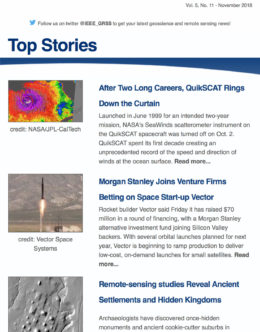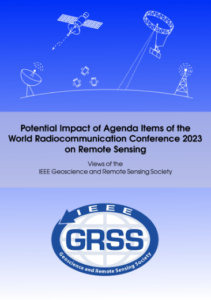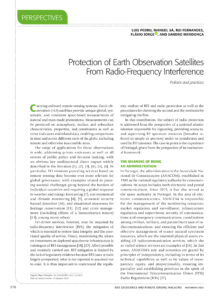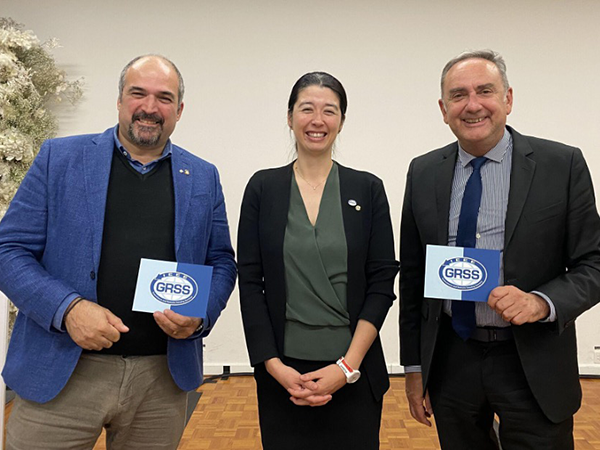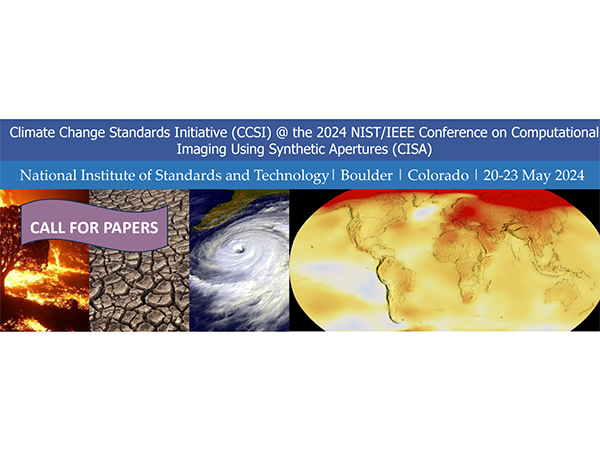Frequency Allocations in Remote Sensing (FARS) Technical Committee

Mission
The Frequency allocations in Remote Sensing (FARS) Technical Committee goal is to interface between GRSS and the radio-frequency regulatory world by
- Educating the remote sensing community on spectrum management processes and issues
- Promoting the development of radio frequency interference detection and mitigation technology
- Organizing technical sessions at conferences, workshops, etc. on the above processes, issues and technologies,
- Providing spectrum managers and regulators with technical input and perspective from remote sensing scientists and engineers
- Fostering the exchange of information between researchers in different fields, such as remote sensing, radio astronomy, telecommunications, etc. with the common scope of minimizing harmful interference between systems
- Organization
- News
- Working Groups
- Tools
- Resources
- Documents
- Archive
- Members
- Contact
Organization
The FARS Technical Committee encourages participation from all its members. The committee organization includes the Chair, three Co-Chairs and a Secretary.FARS Technical Committee Chair
  |
Dr. Paolo de Matthaeis Goddard Earth Sciences Technology and Research Center (GESTAR) NASA Goddard Space Flight Center Greenbelt, Maryland, USA |
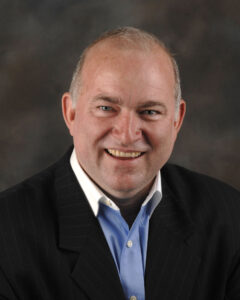  |
Mr. Beau Backus Johns Hopkins Applied Physics Laboratory NOAA NESDIS Silver Spring, Maryland, USA |
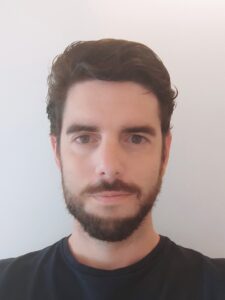  |
Mr. Raúl Díez-García Telespazio UK Ltd for European Space Agency (ESA) Madrid, Spain |
  |
Dr. Ming-Liang Tao Northwestern Polytechnical University Xi’an, China |
  |
Mr. Aravind Venkitasubramony |
News


GRSS sends a letter to the United States Congress.
On July 20, 2021, the Committee on Science, Space and Technology of the United States House of Representatives held a hearing on Spectrum Needs for Observations in Earth and Space Sciences. FARS TC member David Lubar was among the witnesses who gave a testimony and answered questions from members of the Committee on Science, Space and Technology. The video recording of the hearing is available here. Following the hearing, the FARS Technical Committee prepared a letter that the GRSS President David Kunkee signed and sent to the Committee on Science, Space and Technology to serve as a Statement for Record for the 20 July 2021 hearing. The letter is available here IEEE-GRSS_Letter.
The FARS Technical Committee Advisor on Spectrum Management Thomas von Deak suddenly passed away on July 30, 2021, aged 67.
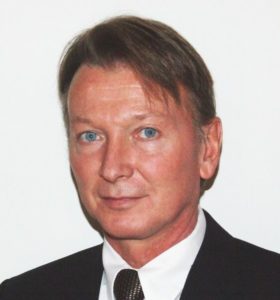

Thomas (Tom) von Deak suddenly and unexpectedly passed away on July 30, 2021, at the age of 67, in his home in Medina, Ohio. He is survived by his loving wife, Amanda, seven children and stepchildren, five grandchildren and three siblings.
Tom graduated from Cornell University with an Electrical Engineering degree. He worked for more than 20 years at the National Aeronautics and Space Administration (NASA) Glenn Research Center in Cleveland, Ohio, during which time he was a spectrum manager in the NASA Office of Spectrum Management for 18 years. He was responsible for ensuring that all spectrum/regulatory aspects of NASA Earth science remote sensing program were addressed in the proceedings within the International Telecommunications Union – Radiocommunication Sector (ITU-R).
Tom retired from NASA in 2018, and, along with being a consultant for the National Oceanic and Atmospheric Administration (NOAA), he became more and more involved in the Frequency Allocations in Remote Sensing (FARS) Technical Committee of the IEEE Geoscience and Remote Sensing Society (GRSS), participating in many of its activities. His contribution to representing IEEE GRSS and defending the interests of the remote sensing community at US national level and internationally at the ITU-R and the Space Frequency Coordination Group (SFCG) was invaluable. In 2020, Tom had also started getting engaged in the IGARSS 2021 organization with the planning of the FARS Technical Committee invited technical sessions.
Tom had an optimistic personality and was always looking at the bright side even in negative situations. He was enthusiastic about his work and able to transmit his energy to those around him. He was a friend for many within the FARS Technical Committee. With his death, the remote sensing community has lost an exceptional champion and will be sorely missed.
Thank you Tom from all your friends in the FARS Technical Committee and at GRSS!
Working Groups
The FARS Technical Committee organizes some of its activities in Working Groups to which all Technical Committee members are welcome to participate. If you are interested in joining any of the Working Groups below please send an e-mail message to fars_chairs@grss-ieee.org indicating the particular Working Group in which you would like to participate in the Subject (e.g., “request to join [name of Working Group]” ) and briefly introducing yourself and your interest in the message body.
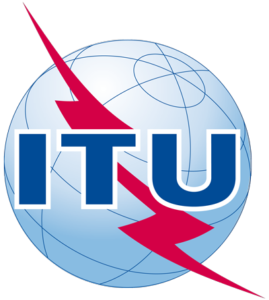

Involvement in ITU-R Study Groups and SFCG
Working Group Chair: Paolo de Matthaeis
The International Telecommunication Union (ITU) is the United Nations specialized agency founded in 1865 to facilitate international connectivity in communications networks, develops the technical standards that ensure networks and technologies seamlessly interconnect and strives to improve access to for information and communication technologies to underserved communities worldwide. The ITU Radiocommunication Sector (ITU-R) is one of the three sectors (divisions or units) of the ITU and is responsible for radio communications. Its role is to manage the international radio-frequency spectrum and satellite orbit resources and to develop standards for radiocommunication systems with the objective of ensuring the effective use of the spectrum. The ITU-R Study Groups develop the technical bases for decisions taken at World Radiocommunication Conferences and develop global standards (Recommendations), Reports and Handbooks on radiocommunication matters.
The Space Frequency Coordination Group (SFCG) is composed by space agencies and related organizations that use the radio frequency spectrum for scientific purposes, particularly spaceborne remote sensing. It provides a less formal and more flexible environment than the ITU-R for the solution of frequency management problems.
The focus of this FARS-TC Working Group is to participate in the ITU-R Study Groups and the SFCG activities to provide them with technical input on issues affecting remote sensing.
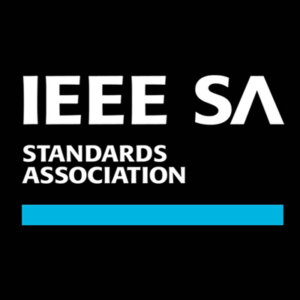

IEEE Standard for Remote Sensing Frequency Band Radio Frequency Interference (RFI) Impact Assessment
Working Group Chair: Roger Oliva
Initiative between FARS-TC and IEEE Standards Association (SA) to develop IEEE Standards on the quality assessment of Earth Exploration-Satellite Services (EESS) frequency bands with respect to the presence of RFI.
Its purpose is to define:
- how to quantitatively assess the presence of man-made RFI in EESS frequency bands
- best practices to consistently document RFI affecting remote sensing missions
More information can be found at: sagroups.ieee.org/4006/ or can be obtained by contacting fars_chairs@grss-ieee.org
Please join the RFI in Remote Sensing Working Group from the IEEE SA if you would like to participate, by registering interest at development.standards.ieee.org/myproject-web/app#interests. An account is necessary, but one doesn’t have to be an IEEE member.
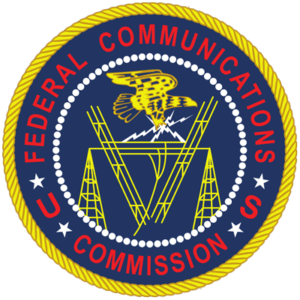

Response to US Federal Communications Commission (FCC) Notices
Working Group Chair: Paolo de Matthaeis
- Objective of the Working Group is to follow activities of the FCC on issues relevant to remote sensing and if necessary prepare comments to submit to the FCC to represent GRSS interests
- Working Group composition and focus will depend on the particular topic under consideration by the FCC
- Past issue: Emission Limits for the 24.25-27.5 GHz Band, notice available at www.federalregister.gov/documents/2021/05/27/2021-10536/emission-limits-for-the-…
- Please contact fars_chairs@grss-ieee.org for more information and if you would like to participate.
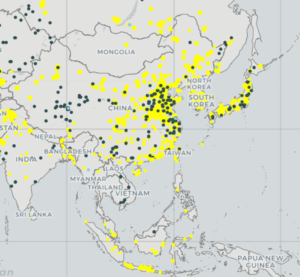

FARS-TC China Subcommittee
Chair: Dr. Mingliang Tao
Widespread Radio Frequency Interference (RFI) is being observed by remote sensing instruments over China, while many new sensors (both active and passive) are planned by China in the next few years. Under the umbrella of the GRSS FARS TC, the goal of the FARS China Subcommittee is to raise awareness of RFI issues in China, and serves as a global, multi-disciplinary network connecting Chinese engineers, scientists, and practitioners from related disciplines to foster further cooperation and collaboration. The China Subcommittee aims at supporting educational initiatives for both students and professionals, and at promoting advances in spectrum management as well as RFI detection and mitigation techniques, with a focus on China. A couple of key areas on which the subcommittee is currently focusing are:
- Documenting RFI observations in China, providing spectrum managers and regulators with technical input and perspective from remote sensing scientists and engineers, and engaging in the regulatory development process in spectrum management.
- Promoting RFI detection and mitigation techniques at different levels, ranging from mission design to a signal processing perspective, encompassing both active and passive remote sensors.
The FARS China Subcommittee invites everyone interested in contributing to contact fars_chairs@grss-ieee.org for details on how to get involved.
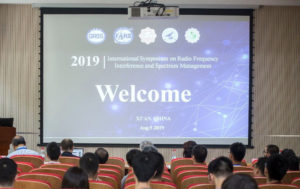

Tools
Welcome to the IEEE GRSS database of Radio Frequency Interference (RFI) observations and frequency allocations for remote sensing. These online tools are still under development and enable one to:
- RFI Observation Tool: List RFI observations in tabular form and locate them on a map
- Frequency Allocation Tool: Lookup and display frequency allocations, with particular attention to those for EESS (Earth Exploration Satellite Service)
A brief tutorial on how to use the RFI observations tool is available here.
Funding for developing these web applications is being provided by the IEEE Geoscience and Remote Sensing Society.
The database of RFI observation has been made possible thanks to the contribution of the SMOS and SMAP project teams to the RFI observation database. It is not intended to cover all occurrences of existing interference affecting these sensors. In addition, RFI may still be present in other EESS bands, even if it is not reported here.
Useful Links
Remote sensing instruments and missions:
RFI detection and localization for SMOS radiometer
Oliva, Roger; Daganzo, Elena; Richaume, Philippe; Kerr, Y; Cabot, Francois; Soldo, Y; Anterrieu, Eric; Reul, Nicolas; Gutierrez, Antonio; Barbosa, Jose; Lopes, G. “Status of Radio Frequency Interference (RFI) in the 1400–1427MHz passive band based on six years of SMOS mission,” Remote Sensing of Environment, Vol. 180, 2016 (www.sciencedirect.com/science/article/abs/pii/S0034425716300141)
Yan Soldo, François Cabot, Ali Khazaal, Maciej Miernecki, Ewa Słomińska, Rémy Fieuzal, and Yann H. Kerr, “Localization of RFI Sources for the SMOS Mission: A Means for Assessing SMOS Pointing Performances,” IEEE Journal of Selected Topics in Applied Earth Observations and Remote Sensing, Vol. 8, No. 2, February 2015. (ieeexplore.ieee.org/stamp/stamp.jsp?arnumber=6873228)
RFI detection and localization for SMAP radiometer
Jeffrey R. Piepmeier, Joel T. Johnson, Priscilla N. Mohammed, Damon Bradley, Christopher Ruf, Mustafa Aksoy, Rafael Garcia, Derek Hudson, Lynn Miles, and Mark Wong, “Radio-Frequency Interference Mitigation for the Soil Moisture Active Passive Microwave Radiometer,” IEEE Transactions on Geoscience and Remote Sensing, Vol. 52, No. 1, January 2014. (ieeexplore.ieee.org/document/6616627)
Soldo, Y., Le Vine, D.M., Bringer, A., de Matthaeis, P., Oliva, R., Johnson, J.T. and Piepmeier, J.R., “Location of Radio-Frequency Interference Sources Using the SMAP L-Band Radiometer,” IEEE Transactions on Geoscience and Remote Sensing, Vol. 99, pp.1-13, 2018. (ieeexplore.ieee.org/document/8403893)
Resources
Related International and National Organizations
- International Telecommunication Union (ITU), an agency of the United Nations
- Space Frequency Coordination Group (SFCG)
- European Conference of Postal and Telecommunications Administrations
(CEPT) - Inter-American Telecommunication Commission (CITEL)
- Asia-Pacific Telecommunity (APT)
- National Telecommunications and Information Administration (NTIA), part of the USA the Department of Commerce
- USA Federal Communications Commission (FCC)
- European Radio Spectrum Policy Group (RSPG)
- European Union Radio Spectrum Committee (RSC)
- Pacific Telecommunications Council (PTC)
- Committee on Radio Frequencies (CORF) of the USA National Academy of Sciences
- Scientific Committee on Frequency Allocations for Radio Astronomy and Space Science (IUCAF) of the International Council for Science
- Committee on Radio Astronomy Frequencies (CRAF) of the European Science Foundation
- ERMIT SMOS RFI tool
- AMS Committee on Radio Frequency Allocations
Documentation
- FCC Table of Frequency Allocations
- European Table of Frequency Allocations
- Chinese Table of Frequency Allocations
- Handbook – Earth Exploration-Satellite Service
- Spectrum Management for Science in the 21st Century
- Handbook of Frequency Allocations and Spectrum Protection for Scientific Uses
- A Strategy for Active Remote Sensing amid Increased Demand for Radio Spectrum
- ITU/WMO Handbook on Use of Radio Spectrum for Meteorology
- ITU Radio Regulations
Documents
GRSS document providing views on international regulatory issues affecting remote sensing operations, in particular on WRC-23 agenda items that could have a potential impact on remote sensing operations (excluding aspects related to satellite-ground communications).
Its purpose is to:
- be a tool for GRSS members to familiarize themselves with these issues and participate in the development of GRSS views concerning them.
- inform remote sensing scientists and engineers of these concerns so that they may engage in their administrations decision-making process to consider the IEEE GRSS views.
FARS-related Magazine Articles
IEEE Geoscience and Remote Sensing Society Magazine, December 2022
Luis Pedro, Manuel Sá, Rui Fernandes, Flávio Jorge, and Sandro Mendonça, “Protection of Earth Observation Satellites From Radio-Frequency Interference
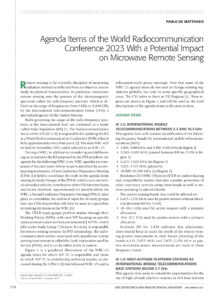

Paolo de Matthaeis, Agenda Items of the World Radiocommunication Conference 2023 With a Potential Impact on Microwave Remote Sensing
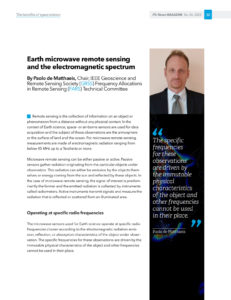

Paolo de Matthaeis, “Earth microwave remote sensing and the electromagnetic spectrum”


Paolo de Matthaeis, Roger Oliva, Yan Soldo, and Sandra Cruz-Pol, “Spectrum Management and Its Importance for Microwave Remote Sensing”
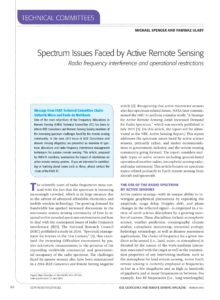

Michael Spencer and Fawwaz Ulaby, “Spectrum Issues Faced by Active Remote Sensing: Radio frequency interference and operational restrictions”
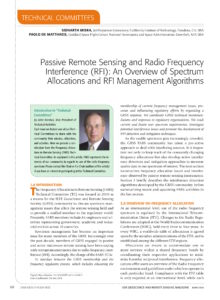

Sidharth Misra, Paolo de Matthaeis, “Passive Remote Sensing and Radio Frequency Interference (RFI): An Overview of Spectrum Allocations and RFI Management Algorithms”


William J. BlackWell and Ian S. Adams, “The IEEE GRSS Frequency allocations in Remote sensing (FaRs) Technical committee”
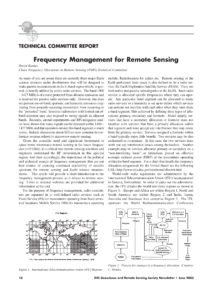

David Kunkee, “Frequency Management for Remote Sensing”
Archive
List of Current and Past Chairs
2023–present: Dr. Paolo de Matthaeis / Beau Backus / Raúl Díez-García / Dr. MingLiang Tao
- 2022–2023: Roger Oliva / Dr. Paolo de Matthaeis / Dr. MingLiang-Tao
- 2021–2022: Roger Oliva / Dr. Paolo de Matthaeis / Dr. Tobias Bollian / Dr. MingLiang-Tao
- 2020–2021: Dr. Paolo de Matthaeis / Roger Oliva / Dr. Tobias Bollian
- 2017–2020: Dr. Paolo de Matthaeis / Roger Oliva / Dr. Yan Soldo
- 2013–2017: Dr. Sidharth Misra / Dr. Paolo de Matthaeis
- 2011–2013: Dr. William Blackwell / Dr. Ian Adams
- 2007–2009: Dr. Shannon Brown / Dr. Ian Adams
- 2005–2007: Dr. Joel Johnson / Dr. Dave Kunkee & Dr. Shannon Brown
- 2003–2005: Dr. David Kunkee / Dr. David DeBoer
- 2002–2003: Dr. Chris Ruf / Dr. Ram Narayanan
- 2001–2002: Dr. Ram Narayanan / Dr. Chris Ruf
- 2000–2001: Dr. Ram Narayanan
Presentations and minutes from past annual meetings
- FARS 2023 Meeting presentation
- FARS 2022 Meeting presentation
- FARS 2022 Meeting presentation
- FARS 2022 Meeting minutes
- FARS 2021 Meeting video
- FARS 2020 Meeting presentation
- FARS 2020 Meeting minutes
- FARS 2019 Meeting presentation
- FARS 2019 Meeting minutes
- FARS 2017 Meeting presentation
- FARS 2017 Meeting minutes
- FARS 2016 Meeting presentation
- FARS 2016 Meeting minutes
- FARS 2014 Meeting presentation
- FARS 2014 Meeting minutes
- FARS 2013 Meeting presentation
- FARS 2011 Meeting presentation
- FARS 2011 Meeting minutes
- FARS 2009 Meeting presentation
- FARS 2008 Meeting minutes
- FARS 2007 Meeting presentation
Other Recent Meetings
- RFI discussion at MicroRad 2020 Virtual Symposium
- Minutes of the meeting
- Presentation slides on “IEEE Standards for RFI Contamination Assessment”
- Video Recording of the “IEEE Standards for RFI Contamination Assessment” and discussion (starts at 01:09:25)
Current membership (as of January 2024)
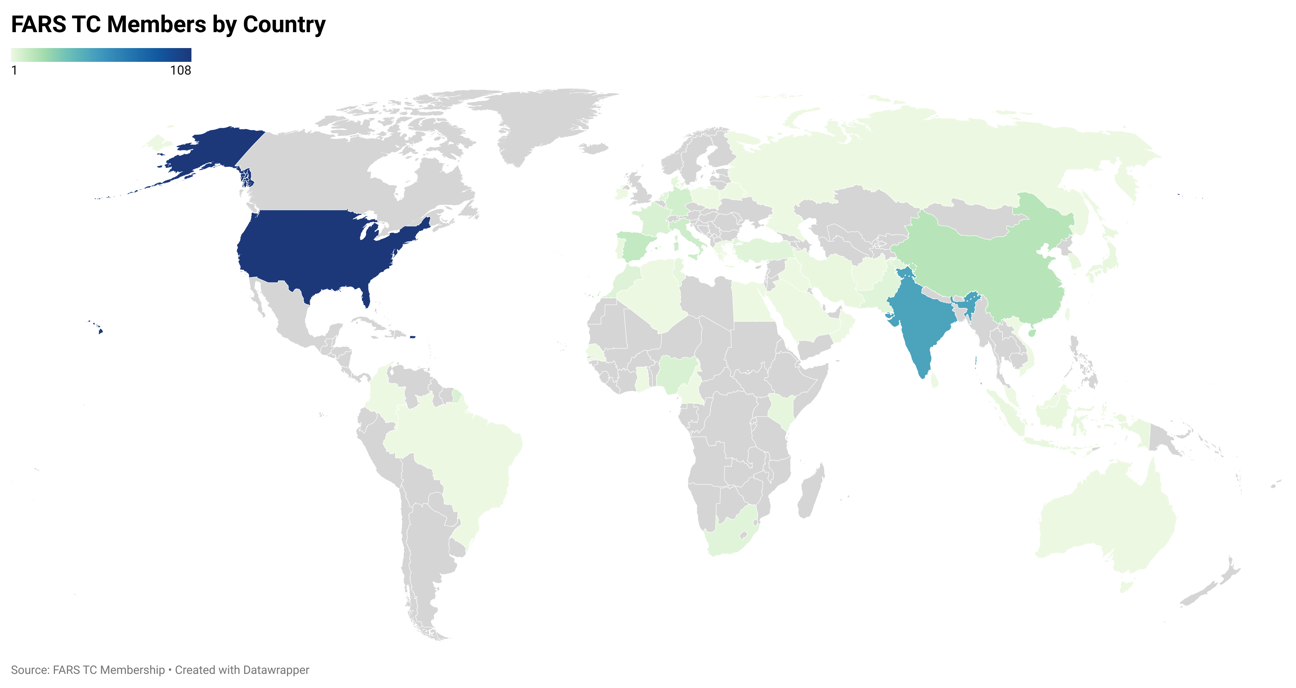

Contact
You can contact the Committee Chairs by email at fars_chairs@grss-ieee.org.
Membership in the FARS Technical committee is open to anyone interested in issues related to frequency allocations for remote sensing. IEEE Geoscience and Remote Society membership is encouraged, but not required to join the FARS Technical Committee. Join the FARS Technical Committee









